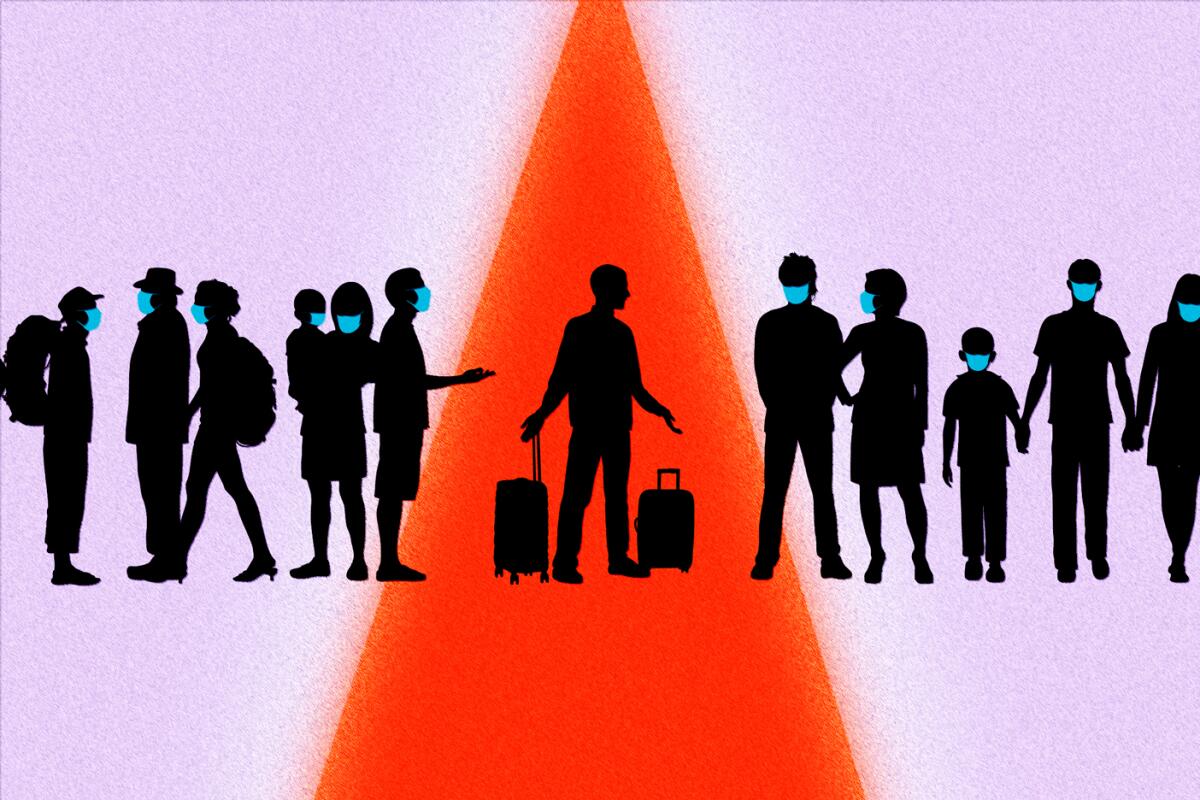Is someone behaving badly on your tour? Here’s what you should — and shouldn’t — do

- Share via
Is it safe to travel? That’s the question on travelers’ minds and here’s the answer: Uncertain. What is clear is that when we begin to move about again, group travel will be appealing because of the rules and regulations, especially for foreign destinations. Someone else will take care of the details about whether a COVID-19 test is required or whether a country is open and what its mask rules are, never mind the millions of other details.
But the escorted tour, besides having to address concerns about social distancing and mask wearing, does have one certainty: There will always be one person in your group who is a PITA — a Pain in the Anatomy. (You get to decide which part of the anatomy — arm, ankle, aorta, etc.)
Besides having someone else tend to the details, escorted tours offer travelers a chance to meet like-minded people. Some will be wonderful and others, well, others will always be late, talk too loudly, complain constantly or drink too much. Worst of all, the PITA may be a family member who brings “group pariah” status to all of you.
The pandemic may have frayed your last nerve, and now this person is on it — whoever they are.
As with all travel, be prepared to meet the challenges of the road, including safety and whether it’s wrong to want to punch out the person who seems intent on wrecking your vacation. (Short answer: Yes, it’s wrong. Resist.) Before you make plans, consider these points:
Is it safe to travel? “Unfortunately, it is … impossible to answer this,” said Dr. Paul Chung, chair of health systems science and a professor at Kaiser Permanente’s Bernard J. Tyson School of Medicine in Pasadena. It’s not a yes or no answer. “It’s always about weighing the risks versus the benefits,” he said.
Be honest with yourself and know that “risk rises with the level of uncertainty,” he said. Wherever you go, be it the grocery store or the airport, you will encounter people and places whose back stories you don’t know.
“Travel increases your chance of spreading and getting COVID-19,” the Centers for Disease Control and Prevention website notes. It urges vaccination as soon as it’s available to you, testing, masking, social distancing and following governing guidelines for your destination.
If you’ve worked out your risk versus reward equation and you’ve decided the rewards outweigh risk, here’s the next question, given this stressful year:
Is traveling, which has its own complications, asking for more psychological trouble?
Not necessarily if you’re willing to prepare for what Michele Nealon calls “travel hiccups.”
“Traveling is simultaneously a stressful situation and a very happy situation,” said Nealon, a clinical psychologist and president of The Chicago School of Professional Psychology. You can’t anticipate everything that could go wrong on a trip, but you can plan how you will react, she said. If a flight is canceled, for example, consider beforehand how you can make the best of it. Stay calm. Take a walk or do something physical to discharge your stress, which is pent-up adrenaline, she said.
And if you’re with a group with a PITA? “You have to anticipate at some point with some person there’s going to be an issue,” she said. “What can help is focusing on respecting people.” That means avoiding pejorative labels related to age, gender, race, religion or political point of view.
Finally, if that person is getting under your skin, explain your issue to the group leader, Nealon said. But if the PITA continues to bother you, even after a talk with the leader, you are within your rights to say, “Please don’t speak to me that way” or “I’d rather you not sit beside me.” If the person is drunk or otherwise chemically impaired, “be prepared to get up and move away,” she said.
It’s your job to have a good time on vacation, she said. It’s the group leader’s to try to keep a balance.
Mark Anderson, who runs Adventure Vacations in La Jolla, uses “ferocious enthusiasm” and “aggressive kindness” to try to right a situation going awry. But he also knows when to assert his leadership, as he did when a quarrel broke out among 40 seniors he was guiding. “You can’t let the individual or group roll over you,” he said. In telling people to get a grip, you must keep smiling, he said, “even though you might want to choke them.”
Sometimes the group will assist unexpectedly by, say, bursting into applause when the chronically late person boards the bus. “I’ll take [that person] aside,” Anderson said, “and say, ‘You have to help me … stick with the program.’”
Remember, though, that it’s not up to you as a tour participant “to be the guardian angel or social worker or befriend that person,” he said.
As a tour participant, it’s also not your job to be the mask/social distancing/health police. Phyllis Stoller, who runs the Women’s Travel Group, said she made clear all COVID-related protocols with a group she was leading recently. She firmly told her flock that masks would be worn — “no discussion” — and “if somebody is sick — any kind of sick — [she] needs to see a doctor.” (She noted that she can’t require someone to see a physician but can strongly encourage it. “We have in our small print [that] you must abide by all health and safety regulations,” she said, adding that this has long been a requirement.)
Tour leaders can explain the consequences of behaving badly, including leaving that person behind (after warnings about tardiness) or, in extreme cases, telling the disruptive person, “’I’m sorry we can’t make you happy. It’s time to think about whether you should continue on,’” Stoller said.
No matter how irritating, she works to leave that person’s dignity intact. One client was having issues with alcohol and was hospitalized. The participant was told that health was more important than the tour and that group members would return to help with the patient’s journey home. And they did.
In the end, when you encounter a PITA, it’s not up to you to stand up to that person. It’s up to you to stand up for yourself, by disengaging, as politely as possible and by focusing on the pleasure of travel again. It is your trip, but you don’t get to take a vacation from your humanity. And once you’ve seen people behaving badly, why would you want to?
Have a travel problem, dilemma or question? Write to catharine@catharinehamm.com. We regret we cannot answer every inquiry.
More to Read
Sign up for The Wild
We’ll help you find the best places to hike, bike and run, as well as the perfect silent spots for meditation and yoga.
You may occasionally receive promotional content from the Los Angeles Times.







